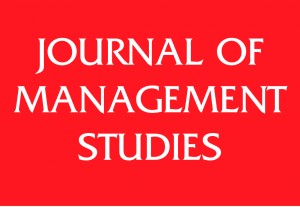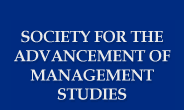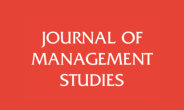
The Future of Work
Call for Papers
Conference Sponsored by Journal of Management Studies & Society for Advancement of Management Studies
2nd – 3rd April, 2020
University of Birmingham, UK
The Future of Work has historically generated considerable attention with academics, practitioners, policy makers and the general public (Balliester and Elsheikhi, 2018; Aronowitz and DiFazio, 1994; Susskind, 1996; Nolan and Wood, 2003). This subject, however, has never been more pressing than today when technological developments – such as artificial intelligence, machine learning, and digitalization -are delivering a “Fourth Industrial Revolution” (Schwab, 2017). These radical advances in technology are disrupting established work practices, organizational structures and societal institutions such as labour markets and training systems. Even cityscapes are transforming as the online economy progressively disrupts the “high street” because of digitalization that allows work-at-home and other flexible off-site work arrangements. The effects of technological innovation are being amplified by demographic changes – such as immigration, declining fertility rates and aging populations – and socio-political ideological changes – such as new generational preferences that question traditional understandings of work, careers and family life and political agendas which are increasingly sceptical of the benefits of globalization, de-regulation and neo-liberalism. Taken together these developments carry significant implications for our economies, societies, political systems, organizations, and individuals. Arguably, understanding the future of work and organization has never been as pressing as it is today.
So far academic commentary on these matters has been very divided between optimists, pessimists and sceptics. Optimists, despite acknowledging challenges, welcome the transformative potential of technology and see this as yielding more prosperity and collaborative and meaningful forms of work (Gratton, 2014; Brynjolfsson and McAfee, 2014; Neufeind et al., 2108) whilst also playing a crucial role in meeting current grand challenges. New jobs are likely to appear creating entirely new markets and entrepreneurial opportunities. Robots and other new production techniques may help to bring manufacturing back to the developed economies (Balliester and Elsheikhi, 2018). In contrast, pessimists predict a jobless future where up to 50% of US jobs may be automated (Frey and Osborne, 2017) and replaced by machines. Importantly, unlike previous rounds of technological development, this will include traditionally secure middle class jobs such as those in the professions (Susskind, 1996; Susskind and Susskind, 2015). Furthermore, as exemplified by debates on the platform economy, the precariat (Standing, 2013) and in-work poverty, new jobs are likely to become more insecure and less rewarding, careers more fragmented whilst workplaces become more exploitative, unequal and with increasingly pervasive surveillance and disciplinary systems. Furthermore, these developments may increase existing inequalities as a new digital divide could further penalize traditionally marginalized groups (WEF 2017; Haskel and Westlake 2017; Rubery et al., 2018). Sceptics question some of these scenarios and predict more limited changes, since there will be ‘strong complementarities that increase productivity, raise earnings and augment demand for skilled labour’ (Autor, 2014:130) so that the processes of de-skilling will be offset by gains in productivity and upskilling requirements connected with the digital economy. Thus for Arntz et al. (2016) job losses to automatization in OECD countries will be limited to 9%. As this debate between utopia, dystopia and business as usual suggest, and despite agreement on the significance of current technological, demographic, and socio-political trends, there is little consensus on how these forces will impact the world of work and how these changes should be understood, regulated and managed across global, societal, organizational, and individual levels and how the government, education systems, and firm HR systems can facilitate this transition.
While many of the conversations around the Future of Work tend to be at the macro-economic level, the effect of technological and societal changes is likely to be mediated and moderated by institutional, organizational and individual responses to these developments. This highlights the importance of the institutional framework for the Future of Work in terms of both the formal and informal institutions that can enhance the positive effects while protecting societies and individual employees from adverse effects. In addition, organizations can play a key role in designing new types of organizational forms, structures, systems, and practices that are dynamic, interconnected, and able to support the new work realities. Furthermore, employee knowledge, skills, and abilities need to adjust to the new requirements, which may require changes in education systems and training, both in terms of content and delivery.
This conference seeks to advance our understanding about the Future of Work and its impact on actors at multiple levels of analysis. We hope that this conference will help to bridge the divide between optimists, pessimists, and sceptics to provide a multi-level and multi-disciplinary understanding of the phenomena. By bringing together new theoretical and empirical contributions, we hope that the conference will (1) examine how trends related to the Future of Work will affect individuals, groups, networks, organizations, and industries (2) offer relevant and actionable managerial and policy implications, and (3) set the course for a new direction of studies that look at the Future of Work through different disciplinary and interdisciplinary lenses.
We call for theoretical and empirical papers on topics that include but are not limited to the following:
- How can we organize for the Future of Work (e.g., new and flexible organization forms)? What are the relevant organizational forms, practices, systems, and cultures we require?
- To what extent and in what ways do new technologies (e.g. artificial intelligence) and technological trends (e.g. digitalization) produce individual, group, organizational, and interorganizational outcomes and what are the mediating and moderating mechanisms at play?
- To what extent and how are market solutions (e.g. crowdsourcing, independent contractors) replacing traditional organization-based solutions in addressing the Future of Work problems?
- How can society and organizations, including governments, respond to changes in work practices and prepare individuals for the realities of the Future of Work (e.g., through education, training, re-training and lifelong learning)?
- How are organizational and individual learning, knowledge transfer and innovation influenced by new transformational technologies?
- How can entrepreneurs recognize and take advantage of the emerging opportunities facilitated by the trends connected to the Future of Work?
- How can challenges and opportunities connected to the Future of Work relate to current societal Grand Challenges?
- What are the key resources and capabilities related to the Future of Work?
- How can competitive and corporate strategy respond to the opportunities and challenges related to the Future of Work?
- How does cross-generational conflict and collaboration affect the Future of Work?
- How does the Future of Work challenge the assumptions and boundary conditions of traditional organization and management theories? Are there new theories for the future of work?
- How will specific jobs such as HR professionals, analysts, administrators, technical core, middle managers, top managers, strategic planners, etc. change in the future?
- What are the critical multi-level Future of Work theoretical and methodological issues?
Keynote Speakers

Professor Jacqueline O’Reilly is Professor of Comparative HRM and Co-Director of the Digital Futures at Work Research Center at the University of Sussex Business School together with Prof Mark Stuart from Leeds University Business School. She has recently published open access books on Work in the Digtal Age (https://policynetwork.org/features/work-digital-age), Youth Labor in Transition (OUP) (https://bit.ly/2xIgPHa) and Youth Employment (Bristol University Press) (https://policy.bristoluniversitypress.co.uk/youth-employment). Her recent research focuses on gender and ethnic inequalities in the labour market and the digital transformation of work from a comparative perspective. She has served on the German Excellence Initiative of the Deutsche Forschungsgemeinschaft (DFG, German Research Foundation) and in an advisory capacity to the Cabinet Office.

Dr Daniel Susskind is a Fellow in Economics at Balliol College, Oxford University, where he teaches and researches. He is the co-author of the best-selling book, The Future of the Professions. Previously he worked in the British Government – as a policy adviser in the Prime Minister’s Strategy Unit, as a policy analyst in the Policy Unit in 10 Downing Street, and as a senior policy adviser in the Cabinet Office. He was a Kennedy Scholar at Harvard University.
Call for Papers
An abstract of up to 1,000 words should be submitted by 16.00 GMT, 4th October 2019 by email to Joanne Cheseldine at business.jms@durham.ac.uk.
Acceptance of abstracts will be notified by 22 November 2019.
Full papers are to be submitted for circulation by 16.00 GMT, 21th February 2020.
Authors of papers presented at the conference will be invited to submit their papers for possible publication in a special issue of the Journal of Management Studies related to the topic of “The Future of Work”. Presentation at the conference does not guarantee publication of the article nor will submissions to the special issue be limited to those that present at the conference.
Call for Participation
There is no conference fee, and we encourage a variety of modes of participation, from presentation of academic papers to the contribution of debate by taking on the role of discussant.
In addition to leading academics in the field of management studies, the conference will also bring together promising new researchers. Limited travel and accommodation support will be offered to outstanding doctoral students.
Conference Organizing Committee
Conveners of the conference are Jonathan Doh, Daniel Muzio, John Prescott, and Riikka Sarala and the editorial management team of Margaret Turner, Joanne Cheseldine, Gemma Parkinson and Melissa MacAulay.
Full Call available here: JMS Conference Call for Papers 2020

